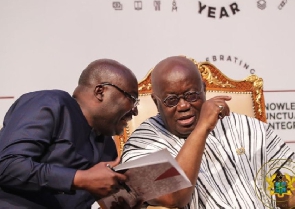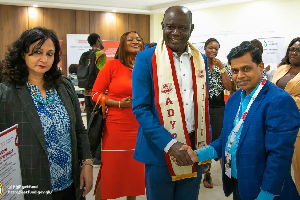The continuous escalation of the sufferings of Ghanaians for the past 6 years and counting under the Nana-Bawumia-led regime is gravely concerning to many in the country and beyond.
I strongly believe that Ghana is indeed in a dire economic and governance hole! Thus, this government needs to take more pragmatic and genuine steps rather than short-term and eye-pleasing measures.
It is often said that when you are already in a hole, you don’t continue to dig but you rather stop digging and try to come out of it. This is what the Nana-Bawumia-led government should do right now to address the largely self-inflicted problems in the country.
Before this government came to power in 2017, it raised the expectations of most Ghanaians with promises of measured borrowing, sustainable jobs for the youth, flagship projects, corruption flights, etc.
However, this government delivered below expectations since 2017 and Ghanaians are rather experiencing excruciating hardships now. For instance, 1) unsustainable debt levels, 2) ballooned expenditure envelop at the presidency, 3) inadequate capital investments/sustainable jobs, and 4) struggling promised flagship projects are having negative rippling effects on the livelihoods of Ghanaians right now.
In the midst of the above-cited troubling economic and social circumstances, the application of the nudge theory is extremely necessary. Let me explain why!
The nudge theory is based upon the idea that by shaping the environment (also called choice architecture), one can influence the likelihood that one option is chosen over another by individuals.
The concept of nudge theory was introduced by Richard Thaler and Cass Sunstein1 and has recently come to prominence in the last decade to influence behaviour.
A key element of nudge theory is giving an individual the ability to maintain freedom of choice and feel in control of their decisions.
Honestly speaking, government’s attempts to shape policy choice options for citizens to buy in are largely ineffective or at best highly repulsive. For instance, the Rambo style of recently passed e-levy coupled with opaque accounting of president’s expensive international travels, ‘fat’ government size with no major reshuffles over 6 years, unbridled borrowing by the Finance Minister, Hon. Ken Offori-Atta, leading to his censure and now the domestic debt exchange programme for the IMF staff-level arrangement have exacerbated the plight of Ghanaians.
The government of Ghana should have honestly focused on demonstrating measurable commitments to reducing borrowing and discretionary expenditure to sustainably manage both the domestic and international debt levels. With respect to the e-levy passage, the Majority in Parliament arrogantly pushed it through to the dislike of many Ghanaians, leading to its poor performance to rake in the needed revenue for government.
Therefore, the use of nudge theory by government will help to assuage the sufferings of Ghanaians by deliberately shaping transparent and convincing policy options or taking actions with direct citizens’ involvement.
This will voluntarily attract majority of Ghanaians and positively change their behaviours to assist in restructuring Ghana’s worrying debt situation. Any mounting of additional income taxes coupled with worsened hikes in inflation of goods and services as well as petrol prices will not help the already precarious situation in the country. I hope the government listens to this unsolicited advice.
References
1. Thaler, R., & Sunstein, C. (2008). Nudge: Improving decisions about health, wealth, and happiness. New Haven: Yale University Press.
Opinions of Monday, 12 December 2022
Columnist: Dr. John-Baptist Naah















